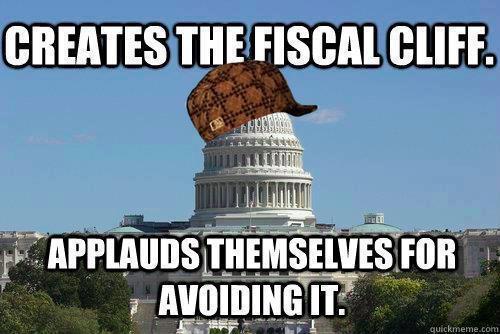
When government creates the "fiscal cliff" disaster, how can they also be trusted to fix the problem? The eleventh-hour "compromise" should be evidence enough that they can't. The only effective solution was to raise taxes, rather than cut spending. But we can't ween anyone off of entitlements until we address the systemic failures.
Washington's effort to avoid the fiscal cliff did not involve a grand deal that President Obama had sought, but the American Taxpayer Relief Act, as it's called, certainly did involve a grand compromise. And maybe we can breathe easy for a while.
"Bipartisanship" is hardly an acceptable replacement for individual choice without intervention. Because we are being exploited by the Left and the Right in a cooperative manner, is the effort any less immoral?
In the meantime, older Americans have been spared any meaningful hits, unless they make more than $400,000 a year ($450,000 for couples). In this case, they will see big tax increases and also reductions in allowable tax deductions. But for the rest of us, the law hurriedly and reluctantly passed includes eight key features of special interest.
While taxes have gone up, there have been no significant spending cuts. I expect to look back and see spending rates actually increase from this point, as proposed budgets today don't seem to have any reductions anything but proposed increases.
No Social Security cuts. Lawmakers dropped a proposal to use a less-generous price index to determine the program's annual cost of living adjustment (COLA). This would have reduced future benefit increases by roughly 3 percent a year, adding up to an increasingly large benefit cut over time.
Meanwhile, the end of the temporary two-year reduction in an employee's share of payroll taxes (from 6.2 to 4.2 percent of covered payroll) removes a linkage between Social Security and broader government funding that program defenders are glad to see.
Days after the tax hikes, I already see my income reduced by nearly $1, 200 per year, yet I am hardly the "rich" that the Left are inclined to seek to devour. On a bi-weekly pay cycle, that's a Social Security hike of about $36 per check, through that benefit will hardly be available when I reach retirement age in another thirty years. The tax-eaters will hardly tolerate any reductions in the scope of the state, barring a self-inflicted collapse.
No Medicare sequestration cuts. The automatic spending cuts set to occur will now be put off for two months. That's hardly more than a temporary and small Band-Aid, but it does spare seniors from a 2 percent cut in Medicare spending.
I am somewhat bothered by the efforts to undermine my posterity, through increases in taxes on what I would pass along to my children. If I pay taxes on everything I earn, how can it be reasonable to take 40% of that without cause?
Estate taxes. Estates worth up to more than $5.2 million (double that for couples) will be permanently exempt from taxes under the new law, and the tax rate on amounts above this is 40 percent. These terms are much more generous than those supported by the White House and many Democrats. It is likely that neither party will want to revisit this contentious issue for a long time.
More: http://feedproxy.google.com/~r/businessinsider/~3/doM8a3UPwN8/american-taxpayer-relief-act-and-seniors-2013-1










